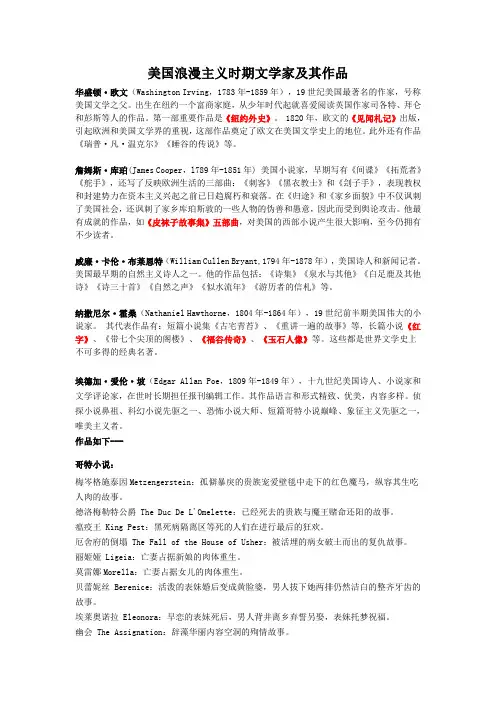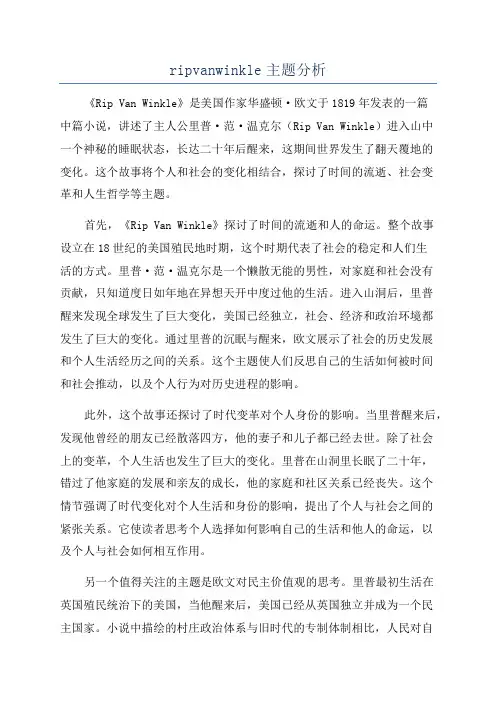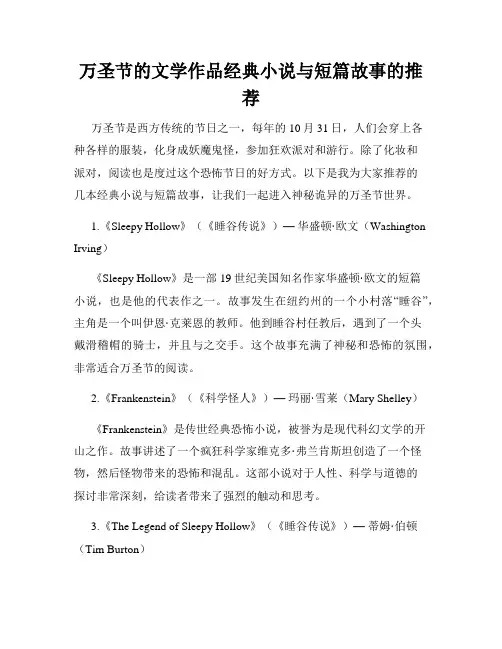华盛顿欧文作品
- 格式:ppt
- 大小:1.77 MB
- 文档页数:10

美国浪漫主义时期文学家及其作品华盛顿·欧文(Washington Irving,1783年-1859年),19世纪美国最著名的作家,号称美国文学之父。
出生在纽约一个富商家庭,从少年时代起就喜爱阅读英国作家司各特、拜仑和彭斯等人的作品。
第一部重要作品是《纽约外史》。
1820年,欧文的《见闻札记》出版,引起欧洲和美国文学界的重视,这部作品奠定了欧文在美国文学史上的地位。
此外还有作品《瑞普·凡·温克尔》《睡谷的传说》等。
詹姆斯·库珀(James Cooper,l789年-1851年) 美国小说家,早期写有《间谍》《拓荒者》《舵手》,还写了反映欧洲生活的三部曲:《刺客》《黑衣教士》和《刽子手》,表现教权和封建势力在资本主义兴起之前已日趋腐朽和衰落。
在《归途》和《家乡面貌》中不仅讽刺了美国社会,还讽刺了家乡库珀斯敦的一些人物的伪善和愚意,因此而受到舆论攻击。
他最有成就的作品,如《皮袜子故事集》五部曲,对美国的西部小说产生很大影响,至今仍拥有不少读者。
威廉·卡伦·布莱恩特(William Cullen Bryant,1794年-1878年),美国诗人和新闻记者。
美国最早期的自然主义诗人之一。
他的作品包括:《诗集》《泉水与其他》《白足鹿及其他诗》《诗三十首》《自然之声》《似水流年》《游历者的信札》等。
纳撒尼尔·霍桑(Nathaniel Hawthorne,1804年-1864年),19世纪前半期美国伟大的小说家。
其代表作品有:短篇小说集《古宅青苔》、《重讲一遍的故事》等,长篇小说《红字》、《带七个尖顶的阁楼》、《福谷传奇》、《玉石人像》等。
这些都是世界文学史上不可多得的经典名著。
埃德加·爱伦·坡(Edgar Allan Poe,1809年-1849年),十九世纪美国诗人、小说家和文学评论家,在世时长期担任报刊编辑工作。


Unit 1 Washington Irving作家介绍:华盛顿·欧文(Washington Irving,1783 年4 月3 日–1859年11月28日),出生于纽约一个富商家庭。
幼年体弱多病,16岁辍学,先后在几个律师事务所学法律,但对法律并没有兴趣,喜爱文学、旅游。
1806年在弗吉尼亚州任律师,并与律师霍夫曼的女儿玛蒂尔达订婚。
妻子早逝于1809年,后来虽有过几次恋爱,却一直过着独身生活。
欧文的第一部重要作品是《纽约外史》。
1820年,他的《见闻札记》出版,引起欧洲和美国文学界的重视,也奠定了他在美国文学史上的地位。
该作品包含了他最为脍炙人口的名篇《瑞普·凡·温克尔》和《睡谷的传说》。
晚年他在曾描写过的睡谷附近度过。
因其对美国文学的巨大贡献,欧文被尊称为“美国文学之父”。
内容摘要:瑞普·凡·温克尔是一个心底善良、和蔼可亲的人。
他乐于帮助别人,但在自己家里却十分懒惰。
有一天,为了躲避唠叨凶悍的妻子,他独自到附近的赫德森河畔兹吉尔山上去打猎。
途中,他巧遇了当年发现这条河的赫德森船长及其伙伴,在喝了他们的仙酒后,睡了一觉。
醒后下山回家,才发现时间已过了整整二十年,人世沧桑,一切都十分陌生。
原本闭塞的山村现在一片沸腾,到处是演说、传单、竞选。
恍惚中,瑞普发现酒店招牌上英王乔治的画像变了。
红色的上衣变成了蓝黄色,手中的王笏变成宝剑,头冠三角帽,下面是”华盛顿将军”的字眼。
经过一番曲折后,瑞普终于知道,他现在已由英王的臣民变成”合众国的一个自由的公民”。
但对所有这些变化,瑞普无动于衷,因为他最担心的是家“女人的专政”。
作品导读:《瑞普·凡·温克尔》出自欧文的《见闻札记》。
该作品是作家最知名的代表作,包括小说、散文、杂感等32篇,以幽默风趣的笔调和富于幻想的浪漫色彩,描写了英国和美国古老的风俗习惯以及善良淳朴的旧式人物。
作家喜欢田园生活和古代遗风,爱写随笔和短篇小说,尤为关注奇闻轶事和穷乡僻壤的风俗习惯。

华盛顿·欧文——美国文学之父华盛顿·欧文介绍中文名:华盛顿·欧文外文名:Washington Irving别名:美国文学之父国籍:美国出生地:美国纽约出生日期:1783年4月3日逝世日期:1859年11月28日职业:作家主要成就:著《见闻札记》开创美国短篇小说传统代表作品:《纽约外史》、《见闻札记》短篇小说:《瑞普·凡·温克尔》华盛顿·欧文是19世纪美国最著名的作家,号称美国文学之父。
1783年4月3日出生在纽约一个富商家庭。
从欧文少年时代起就喜爱阅读英国作家司各特、拜伦和彭斯等人的作品。
欧文的第一部重要作品是《纽约外史》。
1819年,欧文的《见闻札记》出版,引起欧洲和美国文学界的重视,这部作品奠定了欧文在美国文学史上的地位。
生平介绍早年经历华盛顿·欧文,美国作家。
出生于纽约。
他的父亲是纽约富有的五金商人,长老会执事,政治上反对英国殖民统治;他敬重华盛顿,因而给儿子取名为华盛顿。
欧文幼年体弱多病,16岁辍学,先后在几个律师事务所学法律,但对法律并没有兴趣,喜爱文学,从小喜欢看《鲁滨逊漂流记》、《格列佛游记》这种历险故事,还常常钻到剧院里去看戏。
欧文后来最知名的作品是《见闻札记》,写的就是在外游历的故事,不能不说是幼时受到了读书的影响。
1802年,19岁的欧文在《早晨纪事报》上发表了几篇书信体散文,崭露头角。
1804年因病赴欧洲休养,到过法国、意大利和英国,作了大量旅途笔记,为以后的创作积累了丰富的素材,一度想成为画家。
1806年回国后在弗吉尼亚州任律师,后帮助他的两个哥哥经营进口生意。
他对法律和经商之道都不甚精通。
这时他与律师霍夫曼的女儿玛蒂尔达订婚,妻子早逝于1809年,后来他虽有过几次恋爱,却一直过着独身生活。
1807年,他和哥哥威廉等人共同创办一种不定期刊物《杂拌》,沿袭18世纪英国作家乔纳森·斯威夫特、亨利·菲尔丁以及约瑟夫·艾迪生和理查德·斯梯尔的《旁观者》的传统,开始了他的文学创作活动,显露出他的幽默、风趣和含蓄的讽刺才能。

华盛顿·欧文(1783-1859)是美国历史上第一位享有国际声誉的作家。
曾任美国驻伦敦使馆秘书和美国驻西班牙公使。
1783年4月3日出生在纽约一个富商家庭。
欧文从少年时代起就喜爱阅读英国作家司各特、拜仑和彭斯等人的作品。
欧文的第一部重要作品是《纽约外史》,1820年,欧文的《见闻札记》出版,引起欧洲和美国文学界的重视,这部作品奠定了欧文在美国文学史上的地位。
之后,欧文又创作了多部作品,如:《阿尔罕伯拉》、《攻克格拉纳达》、《哥伦布传》等等。
欧文是散文大师,是美国文学奠基人之一。
他的文笔优雅自然,清新精致,时常流露出温和的幽默。
1859年11月28日,欧文与世长辞,美国人民为了怀念这位在文学方面做出突出贡献的作家,在纽约下半旗致哀,而欧文的许多优秀作品则被人们传诵至今,成为珍贵的文学遗产。
他本人更被尊为“美国文学之父”。
1783年,欧文出生在纽约的一个富人家庭,他从小喜欢看《鲁滨逊漂流记》、《格列佛游记》这种历险故事,还常常钻到剧院里去看戏。
欧文后来最知名的作品是《见闻札记》,写的就是在外游历的故事,不能不说是幼时受到了读书的影响。
早期翻译名家林纾将《见闻札记》译成中文,取名《拊掌录》,这是欧文作品的第一个中译本。
林纾在序中说:“欧文气量宏广,而思致深邃而便敏,行文跳踊变化,匪夷所思。
其雅趣高情……又博古,广哀遗典,叩以所有,无不立应。
”给予了他很高的评价。
1809年,他的第一部作品《纽约外史》以“迪德里希·尼克博克”的笔名出版。
这是一部具有独特风格的诙谐之作,充分显露出欧文的幽默才能。
《纽约外史》出版后,欧文便成为纽约文坛风靡一时的人物。
在这之前,美国虽然获得独立已有三十余年,但在文学方面却始终未能摆脱英国的束缚,创作出足以代表这个新兴资产阶级共和国的作品来。
欧文运用本国题材写出的《纽约外史》这部具有民族特色的作品,对于促进美国民族文学的发展有着重要的意义。
1815年,欧文再度赴英。

华盛顿欧文的作品
华盛顿欧文是美国近代著名的作家和讽刺家,他以他独特的文风和对人性的深刻洞察而闻名于世。
华盛顿欧文的作品丰富多样,包括小说、散文、戏剧等多种文学形式。
他的作品以智慧和幽默的揭示人性的弱点和荒谬之处,同时也表达了对社会问题的尖锐观察和思考。
《吉普赛人的浪漫》是华盛顿欧文的一部小说作品,该书讲述了一个年轻人的冒险故事,在这个故事中夹杂了对浪漫和自由生活的憧憬。
小说以轻松的笔调描绘了吉普赛人的神秘和魅力,展现了欧文对自由和异国文化的热爱。
《风味文化》是华盛顿欧文的一部散文集,其中包含了他对美国社会和文化的观察和思考。
这部作品以幽默和讽刺的手法揭示了人们装腔作势和愚昧的一面,同时也展现了欧文对美国多样性和独特风味的赞美。
《撒哈拉星的故事》是华盛顿欧文的一部短篇小说集,描绘了一系列奇幻和幽默的故事,充满了幻想和想象力。
这些故事包含了对人性的深刻洞察和对现实世界的一种逃离,通过夸张和扭曲的手法传达了欧文对现实生活的不满和对理想世界的向往。
此外,华盛顿欧文还创作了一些戏剧作品,如《孟菲斯新闻》和《黄中山在外》等。
这些戏剧作品以讽刺和喜剧的手法,反映了社会问题和人性弱点。
欧文通过戏剧形式的表达,使得他的思想更加生动活泼,使观众不仅能欣赏其作品的深度,同时也能从中得到思考和启发。
华盛顿欧文的作品既有趣味性,又有深度,他善于以轻松幽默的方式揭示人们的虚伪和愚昧,同时也探讨了人性的复杂性和社会问题的多样性。
他的作品不仅在当时引起了轰动,也为后来的作家和读者带来了启示。
欧文的作品是美国文学中不可忽视的瑰宝,也是受人喜爱和学习的经典之作。


华盛顿·欧文是19世纪美国最著名的作家,1783年4月3日出生在纽约一个富商家庭。
欧文从少年时代起就喜爱阅读英国作家司各特、拜仑和彭斯等人的作品。
欧文的第一部重要作品是《纽约外史》。
1820年,欧文的《见闻札记》出版,引起欧洲和美国文学界的重视,这部作品奠定了欧文在美国文学史上的地位。
华盛顿·欧文,美国作家,1783年4月3日出生于纽约。
幼年体弱多病,16岁辍学,先后在几个律师事务所学法律,但对法律并没有兴趣,喜爱文学,喜爱漫游。
1804年因病赴欧洲休养,到过法国、意大利和英国,一度想成为画家。
1806年回国后在弗吉尼亚州任律师,后帮助他的两个哥哥经营进口生意。
这时他与律师霍夫曼的女儿玛蒂尔达订,妻子早逝于1809年,后来他虽有过几次恋爱,却一直过着独身生活。
1807年,他和哥哥威廉等人共同创办一种不定期刊物《杂拌》,开始了他的文学创作活动,显露出他的幽默、风趣和含蓄的讽刺才能。
欧文的第一部重要作品是《纽约外史》(1809年),此后10年,除英美战争期间曾于1814年担任过短期军职之外,一直在帮助他的哥哥经商,1815年欧文去英国利物浦在他哥哥所开设的分行工作;1818年分行因经济萧条而倒闭,欧文留居英国,以写作为生。
1819年,欧文陆续发表许多散文、随笔和故事,共32篇;于1820年结集为《见闻札记》出版,引起欧洲和美国文学界的重视。
这部作品奠定了欧文在美国文学史上的地位。
之后,欧文写了体裁相似的《布雷斯布里奇田庄》(1822年)和故事集《旅客谈》(1824年),这两部作品都较《见闻札记》逊色。
1826年在马德里任美国驻西班牙大使馆馆员。
1828年发表《哥伦布的生平和航行》。
1829年发表《攻克格拉纳达》;同年曾到格拉纳达的摩尔人故宫阿尔罕伯拉游览,后出版游记、随笔和故事集《阿尔罕伯拉》(1832年)。
欧文曾任美国驻英公使馆秘书。
牛津大学曾授予其名誉法学博士学位,英国皇家学会也向他颁发了勋章。

ripvanwinkle主题分析《Rip Van Winkle》是美国作家华盛顿·欧文于1819年发表的一篇中篇小说,讲述了主人公里普·范·温克尔(Rip Van Winkle)进入山中一个神秘的睡眠状态,长达二十年后醒来,这期间世界发生了翻天覆地的变化。
这个故事将个人和社会的变化相结合,探讨了时间的流逝、社会变革和人生哲学等主题。
首先,《Rip Van Winkle》探讨了时间的流逝和人的命运。
整个故事设立在18世纪的美国殖民地时期,这个时期代表了社会的稳定和人们生活的方式。
里普·范·温克尔是一个懒散无能的男性,对家庭和社会没有贡献,只知道度日如年地在异想天开中度过他的生活。
进入山洞后,里普醒来发现全球发生了巨大变化,美国已经独立,社会、经济和政治环境都发生了巨大的变化。
通过里普的沉眠与醒来,欧文展示了社会的历史发展和个人生活经历之间的关系。
这个主题使人们反思自己的生活如何被时间和社会推动,以及个人行为对历史进程的影响。
此外,这个故事还探讨了时代变革对个人身份的影响。
当里普醒来后,发现他曾经的朋友已经散落四方,他的妻子和儿子都已经去世。
除了社会上的变革,个人生活也发生了巨大的变化。
里普在山洞里长眠了二十年,错过了他家庭的发展和亲友的成长,他的家庭和社区关系已经丧失。
这个情节强调了时代变化对个人生活和身份的影响,提出了个人与社会之间的紧张关系。
它使读者思考个人选择如何影响自己的生活和他人的命运,以及个人与社会如何相互作用。
另一个值得关注的主题是欧文对民主价值观的思考。
里普最初生活在英国殖民统治下的美国,当他醒来后,美国已经从英国独立并成为一个民主国家。
小说中描绘的村庄政治体系与旧时代的专制体制相比,人民对自己的命运有了更大的掌控权。
欧文通过描绘社会变革,表达了对民主理念的赞美。
通过这个主题,欧文希望读者思考自由、平等和个人自主权这些与民主价值观相关的问题。


万圣节的文学作品经典小说与短篇故事的推荐万圣节是西方传统的节日之一,每年的10月31日,人们会穿上各种各样的服装,化身成妖魔鬼怪,参加狂欢派对和游行。
除了化妆和派对,阅读也是度过这个恐怖节日的好方式。
以下是我为大家推荐的几本经典小说与短篇故事,让我们一起进入神秘诡异的万圣节世界。
1.《Sleepy Hollow》(《睡谷传说》)—华盛顿·欧文(Washington Irving)《Sleepy Hollow》是一部19世纪美国知名作家华盛顿·欧文的短篇小说,也是他的代表作之一。
故事发生在纽约州的一个小村落“睡谷”,主角是一个叫伊恩·克莱恩的教师。
他到睡谷村任教后,遇到了一个头戴滑稽帽的骑士,并且与之交手。
这个故事充满了神秘和恐怖的氛围,非常适合万圣节的阅读。
2.《Frankenstein》(《科学怪人》)—玛丽·雪莱(Mary Shelley)《Frankenstein》是传世经典恐怖小说,被誉为是现代科幻文学的开山之作。
故事讲述了一个疯狂科学家维克多·弗兰肯斯坦创造了一个怪物,然后怪物带来的恐怖和混乱。
这部小说对于人性、科学与道德的探讨非常深刻,给读者带来了强烈的触动和思考。
3.《The Legend of Sleepy Hollow》(《睡谷传说》)—蒂姆·伯顿(Tim Burton)这部小说是根据华盛顿·欧文的同名短篇故事改编而成的电影,由蒂姆·伯顿执导。
该电影于1999年上映,由约翰尼·德普主演,再现了《睡谷传说》中的故事。
蒂姆·伯顿以其独特的幽默和恐怖的风格,将这个经典故事拍成了一部视觉奇观,非常适合在万圣节观看。
4.《Dracula》(《德古拉》)—布拉姆·斯托克(Bram Stoker)《Dracula》是最著名的吸血鬼小说之一,也是18世纪末英国作家布拉姆·斯托克的杰作。
华盛顿欧文的作品
华盛顿欧文是一位十分出色的美国文学家,尤其以其表现美国森
林和河流的优美描写而闻名。
他是19世纪最重要的散文作家,也是《扬·斯科特》和《树林与河流》这两部著名典籍的作者。
在散文作品中,华盛顿欧文使用细致、深入的观察使他的作品被
世人熟知。
他曾多次参加在美国的旅行,并将旅途的深刻感受与精彩
描述表达了出来。
在《河流和树林》一书中,他流畅细腻的描写了美
国的森林生态,以及河流的壮丽景观,加上他对自然的热爱以及对大
自然的赏识,使得这部作品深受读者喜爱。
此外,华盛顿欧文还塑造了家喻户晓的《扬·斯科特》一书,也
被誉为美国经典文学的代表作之一。
故事发生在波士顿,讲述了乐观
勇敢的扬·斯科特随着一支童年家庭船队一起出海探险,他最终决定
留在家园,从此热爱着波士顿的生活,而不是去寻找自己的海洋梦想。
这本书渗透了对家园深厚的怀念之情,并以美国的故事观念展现了丰
富的灵活性和精彩的情节。
华盛顿欧文的作品激发了世人对大自然的热爱和崇敬,他的作品
被世界所推崇,受到广泛的赞誉。
他的作品中,许多理念对现代社会
的发展起到了积极的推动作用,也成为许多文学作品的经典模板。
华盛顿欧文的作品1. 简介华盛顿欧文(Washington Irving)(1783年4月3日-1859年11月28日),美国作家和外交家,被誉为美国文学的奠基人之一。
他的作品以浪漫主义风格为特点,融合了欧洲和美国的文化元素,对美国文学产生了深远影响。
2. 早期生活华盛顿欧文于1783年出生在美国纽约州。
他的家庭并不富裕,但他在家庭的支持下得以接受良好的教育。
他非常喜欢阅读,并受到了文学作品的启发。
在青少年时期,他开始写作,尝试各种不同的文体和风格。
3. 文学成就3.1 短篇小说集《睡谷物》华盛顿欧文的第一部重要作品是短篇小说集《睡谷物》(The Sketch Book),其中的故事《睡美人谷》(The Legend of Sleepy Hollow)和《里普·范·温克尔传》(Rip Van Winkle)至今仍被广泛阅读和赞赏。
这两个故事展现了欧文的幽默风格和对美国传统的批判精神。
3.2 《西班牙传奇》在华盛顿欧文的《西班牙传奇》(Tales of the Alhambra)中,他描述了他在西班牙格拉纳达的居住经历。
这本书描绘了阿尔罕布拉宫和西班牙文化的美丽和神秘。
欧文的写作风格生动活泼,读者能够感受到他对西班牙的热爱和敬意。
3.3 《寿默先生的野史》另一部重要作品是《寿默先生的野史》(A History of New York),这是一部讽刺性的历史小说,描述了纽约市的历史和社会。
欧文以幽默而夸张的方式揭示了政治和社会现象的荒谬之处,这使他成为美国文学中的一位重要人物。
4. 文化影响华盛顿欧文通过他的作品对美国文学产生了深远影响。
他的风格和主题在后来的作家中得到了广泛的传承和发展。
他的作品对美国的文化认同和国家形象的塑造有着重要意义。
5. 总结华盛顿欧文是美国文学的先驱和奠基人之一,他的作品以浪漫主义风格和幽默风格为特色。
他通过讽刺和揭示人类社会的荒谬性,展示了对美国文化和传统的深入理解。
华盛顿欧文的作品
华盛顿欧文是一位杰出的美国作家,他的作品深深影响了我们。
他最著名的作品之一是《联邦党人》,这本书可被认为是美国历史上
最重要的书之一,它描述了美国独立后建立联邦政府的故事。
由于这
篇作品,华盛顿欧文被誉为“美国父亲”。
此外,华盛顿欧文还写了许多短篇小说,比如《西雅图》、《宿敌》、《白狼》、《傍晚时分》和《天堂》等。
《西雅图》是他最著
名的短篇小说之一,它通过自然景物和精神对话,描绘了西雅图印第
安人的生活和价值观。
在《宿敌》中,华盛顿欧文发出了抵抗奴隶制
的声音,探讨了自由和仇恨之间的关系。
而在《白狼》中,他就表达
了他对自然环境、动物和野性的热爱。
此外,华盛顿欧文还写了不少剧本,比如《舞台上的大地》、
《穆格里岛的布列松》、《穆索斯基》和《圣洁的安妮》等。
同时,
他还创作了很多诗歌,比如《农民的春天》、《星夜》、《老学校》、《绿洲》和《再见了,梦想》等。
总之,华盛顿欧文是一位伟大的作家,他的作品深刻影响了美国
的社会和文化,令人敬佩。
作者简介:华盛顿·欧文(Washington Irving)(1789-1895), 美国浪漫主义作家,也是一个纯文学作家,他的写作态度是"writing for pleasure and to produce pleasure"。
欧文的代表作有《见闻札记》(Sketch Book),这是第一部伟大的青少年读物,也是美国本土作家第一部成功的小说。
由于欧文对美国文学的伟大贡献,他获得了“美国文学之父”的光荣称号。
这篇短篇小说,《瑞普·凡·温克尔》便是摘自《见闻札记》。
Rip Van WinkleA Posthumous Writing of Diedrich KnickerbockerBy Washington Irving(T HE FOLLOWING tale was found among the papers of the late Diedrich Knickerbocker, an old gentleman of New York, who was very curious in the Dutch history of the province, and the manners of the descendants from its primitive settlers. His historical researches, however, did not lie so much among books as among men; for the former are lamentably scanty on his favorite topics; whereas he found the old burghers, and still more their wives, rich in that legendary lore so invaluable to true history. Whenever, therefore, he happened upon a genuine Dutch family, snugly shut up in its low-roofed farmhouse, under a spreading sycamore, he looked upon it as a little clasped volume of black-letter, and studied it with the zeal of a bookworm.The result of all these researches was a history of the province during the reign of the Dutch governors, which he published some years since. There have been various opinions as to the literary character of his work, and, to tell the truth, it is not a whit better than it should be. Its chief merit is its scrupulous accuracy, which indeed was a little questioned on its first appearance, but has since been completely established; and it is how admitted into all historical collections as a book of unquestionable authority.The old gentleman died shortly after the publication of his work, and now that he is dead and gone it cannot do much harm to his memory to say that his time might have been much better employed in weightier labors. He, however, was apt to ride his hobby in his own way; and though it did now and then kick up the dust a little in the eyes of his neighbors and grieve the spirit of some friends, for whom he felt the truest deference and affection, yet his errors and follies are remembered “more in sorrow than in anger”; and it begins to be suspected that he never intended to injure or offend. But however his memory may be appreciated by critics, it is still held dear among many folk whose good opinion is well worth having; particularly by certain biscuit bakers, who have gone so far asto imprint his likeness on their New Year cakes, and have thus given him a chance for immortality almost equal to the being stamped on a Waterloo medal or a Queen Anne’s fart hing.)By Woden, God of Saxons,From whence comes Wensday, that is Wodensday,Truth is a thing that ever I will keepUnto thylke day in which I creep intoMy sepulchre—C ARTWRIGHT.Whoever has made a voyage up the Hudson must remember the Catskill Mountains. They are a dismembered branch of the great Appalachian family, and are seen away to the west of the river, swelling up to a noble height, and lording it over the surrounding country. Every change of season, every change of weather, indeed, every hour of the day, produces some change in the magical hues and shapes of these mountains, and they are regarded by all the good wives, far and near, as perfect barometers. When the weather is fair and settled, they are clothed in blue and purple, and print their bold outlines on the clear evening sky; but sometimes, when the rest of the landscape is cloudless, they will gather a hood of gray vapors about their summits, which, in the last rays of the setting sun, will glow and light up like a crown of glory.At the foot of these fairy mountains the voyager may have descried the light smoke curling up from a village whose shingle roofs gleam among the trees, just where the blue tints of the upland melt away into the fresh green of the nearer landscape. It is a little village of great antiquity, having been founded by some of the Dutch colonists, in the early times of the province, just about the beginning of the government of the good Peter Stuyvesant (may he rest in peace!), and there were some of the houses of the original settlers standing within a few years, with lattice windows, gable fronts surmounted with weathercocks, and built of small yellow bricks brought from Holland.In that same village, and in one of these very houses (which, to tell the precise truth, was sadly time-worn and weather-beaten), there lived many years since, while the country was yet a province of Great Britain, a simple, good-natured fellow, of the name of Rip Van Winkle. He was a descendant of the Van Winkles who figured so gallantly in the chivalrous days of Peter Stuyvesant, and accompanied him to the siege of Fort Christina. He inherited, however, but little of the martial character of his ancestors. I have observed that he was a simple, good-natured man; he was, moreover, a kind neighbor and an obedient, henpecked husband. Indeed, to the latter circumstance might be owing that meekness of spirit which gained him such universal popularity; for those men are most aptto be obsequious and conciliating abroad who are under the discipline of shrews at home. Their tempers, doubtless, are rendered pliant and malleable in the fiery furnace of domestic tribulation, and a curtain lecture is worth all the sermons in the world for teaching the virtues of patience and long-suffering. A termagant wife may, therefore, in some respects, be considered a tolerable blessing; and if so, Rip Van Winkle was thrice blessed.Certain it is that he was a great favorite among all the good wives of the village, who, as usual with the amiable sex, took his part in all family squabbles, and never failed, whenever they talked those matters over in their evening gossipings, to lay all the blame on Dame Van Winkle. The children of the village, too, would shout with joy whenever he approached. He assisted at their sports, made their playthings, taught them to fly kites and shoot marbles, and told them long stories of ghosts, witches, and Indians. Whenever he went dodging about the village, he was surrounded by a troop of them, hanging on his skirts, clambering on his back, and playing a thousand tricks on him with impunity; and not a dog would bark at him throughout the neighborhood.The great error in Rip’s composition was an insuperable aversion to all kinds of profitable labor. It could not be from the want of assiduity or perseverance; for he would sit on a wet rock, with a rod as long and heavy as a Tartar’s lance, and fish all day without a murmur, even though he should not be encouraged by a single nibble. He would carry a fowling piece on his shoulder, for hours together, trudging through woods and swamps, and up hill and down dale, to shoot a few squirrels or wild pigeons. He would never even refuse to assist a neighbor in the roughest toil, and was a foremost man at all country frolics for husking Indian corn, or building stone fences. The women of the village, too, used to employ him to run their errands, and to do such little odd jobs as their less obliging husbands would not do for them; in a word, Rip was ready to attend to anybody’s business but his own; but as to doing family duty, and keeping his farm in order, it was impossible.In fact, he declared it was of no use to work on his farm; it was the most pestilent little piece of ground in the whole country; everything about it went wrong, and would go wrong, in spite of him. His fences were continually falling to pieces; his cow would either go astray or get among the cabbages; weeds were sure to grow quicker in his fields than anywhere else; the rain always made a point of setting in just as he had some outdoor work to do; so that though his patrimonial estate had dwindled away under his management, acre by acre, until there was little more left than a mere patch of Indian corn and potatoes, yet it was the worst-conditioned farm in the neighborhood.His children, too, were as ragged and wild as if they belonged to nobody. His son Rip, an urchin begotten in his own likeness, promised toinherit the habits, with the old clothes of his father. He was generally seen trooping like a colt at his mother’s heels, equipped in a pair of his father’s cast-off galligaskins, which he had much ado to hold up with one hand, as a fine lady does her train in bad weather.Rip Van Winkle, however, was one of those happy mortals, of foolish, well-oiled dispositions, who take the world easy, eat white bread or brown, whichever can be got with least thought or trouble, and would rather starve on a penny than work for a pound. If left to himself, he would have whistled life away, in perfect contentment; but his wife kept continually dinning in his ears about his idleness, his carelessness, and the ruin he was bringing on his family. Morning, noon, and night, her tongue was incessantly going, and everything he said or did was sure to produce a torrent of household eloquence. Rip had but one way of replying to all lectures of the kind, and that, by frequent use, had grown into a habit. He shrugged his shoulders, shook his head, cast up his eyes, but said nothing. This, however, always provoked a fresh volley from his wife, so that he was fain to draw off his forces, and take to the outside of the house—the only side which, in truth, belongs to a henpecked husband. Rip’s sole domestic adherent was his dog Wolf, who was as much henpecked as his master; for Dame Van Winkle regarded them as companions in idleness, and even looked upon Wolf with an evil eye, as the cause of his master’s so often going astray. True it is, in all points of spirit befitting an honorable dog, he was as courageous an animal as ever scoured the woods—but what courage can withstand the ever-during and all-besetting terrors of a woman’s tongue? The moment Wolf entered the house his crest fell, his tail drooped to the ground, or curled between his legs; he sneaked about with a gallows air, casting many a sidelong glance at Dame Van Winkle, and at the least flourish of a broomstick or ladle would fly to the door with yelping precipitation.Times grew worse and worse with Rip Van Winkle as years of matrimony rolled on; a tart temper never mellows with age, and a sharp tongue is the only edged tool that grows keener by constant use. For a long while he used to console himself, when driven from home, by frequenting a kind of perpetual club of the sages, philosophers, and other idle personages of the village, which held its sessions on a bench before a small inn, designated by a rubicund portrait of his majesty George the Third. Here they used to sit in the shade, of a long lazy summer’s day, talking listlessly over village gossip, or telling endless sleepy stories about nothing. But it would have been worth any statesman’s money to have heard the profound discussions which sometimes took place, when by chance an old newspaper fell into their hands, from some passing traveler. How solemnly they would listen to the contents, as drawled out by Derrick Van Bummel, the schoolmaster, a dapper, learned little man, who was not to be daunted by the most gigantic word in the dictionary; and how sagelythey would deliberate upon public events some months after they had taken place.The opinions of this junto were completely controlled by Nicholas Vedder, a patriarch of the village, and landlord of the inn, at the door of which he took his seat from morning till night, just moving sufficiently to avoid the sun, and keep in the shade of a large tree; so that the neighbors could tell the hour by his movements as accurately as by a sun-dial. It is true, he was rarely heard to speak, but smoked his pipe incessantly. His adherents, however (for every great man has his adherents), perfectly understood him, and knew how to gather his opinions. When anything that was read or related displeased him, he was observed to smoke his pipe vehemently, and send forth short, frequent, and angry puffs; but when pleased, he would inhale the smoke slowly and tranquilly, and emit it in light and placid clouds, and sometimes taking the pipe from his mouth, and letting the fragrant vapor curl about his nose, would gravely nod his head in token of perfect approbation.From even this stronghold the unlucky Rip was at length routed by his termagant wife, who would suddenly break in upon the tranquillity of the assemblage, and call the members all to nought; nor was that august personage, Nicholas Vedder himself, sacred from the daring tongue of this terrible virago, who charged him outright with encouraging her husband in habits of idleness.Poor Rip was at last reduced almost to despair; and his only alternative, to escape from the labor of the farm and clamor of his wife, was to take gun in hand and stroll away into the woods. Here he would sometimes seat himself at the foot of a tree, and share the contents of his wallet with Wolf, with whom he sympathized as a fellow-sufferer in persecution. “Poor Wolf,” he would say, “thy mistress leads thee a dog’s life of it; but never mind, my lad, while I live thou shalt never want a friend to stand by thee!” Wolf would wag his tail, look wistfully in his master’s face, and if dogs can feel pity, I verily believe he reciprocated the sentiment with all his heart.In a long ramble of the kind on a fine autumnal day, Rip had unconsciously scrambled to one of the highest parts of the Catskill Mountains. He was after his favorite sport of squirrel shooting, and the still solitudes had echoed and reëchoed with the reports of his gun. Panting and fatigued, he threw himself, late in the afternoon, on a green knoll, covered with mountain herbage, that crowned the brow of a precipice. From an opening between the trees he could overlook all the lower country for many a mile of rich woodland. He saw at a distance the lordly Hudson, far, far below him, moving on its silent but majestic course, the reflection of a purple cloud, or the sail of a lagging bark, here and there sleeping on its glassy bosom, and at last losing itself in the blue highlands.On the other side he looked down into a deep mountain glen, wild, lonely, and shagged, the bottom filled with fragments from the impending cliffs, and scarcely lighted by the reflected rays of the setting sun. For some time Rip lay musing on this scene; evening was gradually advancing; the mountains began to throw their long blue shadows over the valleys; he saw that it would be dark long before he could reach the village, and he heaved a heavy sigh when he thought of encountering the terrors of Dame Van Winkle.As he was about to descend, he heard a voice from a distance, hallooing, “Rip Van Winkle! Rip Van Winkle!” He looked around, but could see nothing but a crow winging its solitary flight across the mountain. He thought his fancy must have deceived him, and turned again to descend, when he heard the same cry ring through the still evening air: “Rip Van Winkle! Rip Van Winkle!”—at the same time Wolf bristled up his back, and giving a low growl, skulked to his master’s side, looking fearfu lly down into the glen. Rip now felt a vague apprehension stealing over him; he looked anxiously in the same direction, and perceived a strange figure slowly toiling up the rocks, and bending under the weight of something he carried on his back. He was surprised to see any human being in this lonely and unfrequented place, but supposing it to be some one of the neighborhood in need of assistance, he hastened down to yield it.On nearer approach, he was still more surprised at the singularity of the stranger’s appearance. He was a short, square-built old fellow, with thick bushy hair, and a grizzled beard. His dress was of the antique Dutch fashion—a cloth jerkin strapped around the waist—several pair of breeches, the outer one of ample volume, decorated with rows of buttons down the sides, and bunches at the knees. He bore on his shoulders a stout keg, that seemed full of liquor, and made signs for Rip to approach and assist him with the load. Though rather shy and distrustful of this new acquaintance, Rip complied with his usual alacrity, and mutually relieving one another, they clambered up a narrow gully, apparently the dry bed of a mountain torrent. As they ascended, Rip every now and then heard long rolling peals, like distant thunder, that seemed to issue out of a deep ravine, or rather cleft between lofty rocks, toward which their rugged path conducted. He paused for an instant, but supposing it to be the muttering of one of those transient thunder showers which often take place in mountain heights, he proceeded. Passing through the ravine, they came to a hollow, like a small amphitheater, surrounded by perpendicular precipices, over the brinks of which impending trees shot their branches, so that you only caught glimpses of the azure sky and the bright evening cloud. During the whole time, Rip and his companion had labored on in silence; for though the former marveled greatly what could be the object of carrying a keg of liquor up this wild mountain, yet there was something strange and incomprehensible about the unknown that inspired awe andchecked familiarity.On entering the amphitheater, new objects of wonder presented themselves. On a level spot in the center was a company of odd-looking personages playing at ninepins. They were dressed in a quaint, outlandish fashion: some wore short doublets, others jerkins, with long knives in their belts, and most had enormous breeches, of similar style with that of the guide’s. Their visages, too, were peculiar: one had a large head, broad face, and small, piggish eyes; the face of another seemed to consist entirely of nose, and was surmounted by a white sugar-loaf hat set off with a little red cock’s tail. They all had beards, of various shapes and colors. There was one who seemed to be the commander. He was a stout old gentleman, with a weather-beaten countenance; he wore a laced doublet, broad belt and hanger, high-crowned hat and feather, red stockings, and high-heeled shoes, with roses in them. The whole group reminded Rip of the figures in an old Flemish painting, in the parlor of Dominie Van Schaick, the village parson, and which had been brought over from Holland at the time of the settlement.What seemed particularly odd to Rip, was that though these folks were evidently amusing themselves, yet they maintained the gravest faces, the most mysterious silence, and were, withal, the most melancholy party of pleasure he had ever witnessed. Nothing interrupted the stillness of the scene but the noise of the balls, which, whenever they were rolled, echoed along the mountains like rumbling peals of thunder.As Rip and his companion approached them, they suddenly desisted from their play, and stared at him with such fixed statue-like gaze, and such strange, uncouth, lack-luster countenances, that his heart turned within him, and his knees smote together. His companion now emptied the contents of the keg into large flagons, and made signs to him to wait upon the company. He obeyed with fear and trembling; they quaffed the liquor in profound silence, and then returned to their game.By degrees, Rip’s awe and apprehension subsided. He even ventured, when no eye was fixed upon him, to taste the beverage, which he found had much of the flavor of excellent Hollands. He was naturally a thirsty soul, and was soon tempted to repeat the draught. One taste provoked another, and he reiterated his visits to the flagon so often, that at length his senses were overpowered, his eyes swam in his head, his head gradually declined, and he fell into a deep sleep.On awaking, he found himself on the green knoll from whence he had first seen the old man of the glen. He rubbed his eyes—it was a bright sunny morning. The birds were hopping and twittering among the bushes, and the eagle was wheeling aloft and breasting the pure mountain breeze. “Surely,” thought Rip, “I have not slept here all night.” He recalled the occurrences before he fell asleep. The strange man with a keg of liquor—the mountain ravine—the wild retreat among the rocks—thewoe-begone party at ninepins—the flagon—“Oh! that flag on! that wicked flagon!” thought Rip—“what excuse shall I make to Dame Van Winkle?”He looked round for his gun, but in place of the clean, well-oiled fowling piece, he found an old firelock lying by him, the barrel incrusted with rust, the lock falling off, and the stock worm-eaten. He now suspected that the grave roysters of the mountain had put a trick upon him, and having dosed him with liquor, had robbed him of his gun. Wolf, too, had disappeared, but he might have strayed away after a squirrel or partridge. He whistled after him, shouted his name, but all in vain; the echoes repeated his whistle and shout, but no dog was to be seen.He determined to revisit the scene of the last evening’s gambol, and if he met with any of the party, to demand his dog and gun. As he rose to walk, he found himself stiff in the joints, and wanting in his usual activity. “These mountain beds do not agree with me,” thought Rip, “and if this frolic should lay me up with a fit of the rheumatism, I shall have a blessed time wit h Dame Van Winkle.” With some difficulty he got down into the glen; he found the gully up which he and his companion had ascended the preceding evening; but to his astonishment a mountain stream was now foaming down it, leaping from rock to rock, and filling the glen with babbling murmurs. He, however, made shift to scramble up its sides, working his toilsome way through thickets of birch, sassafras, and witch-hazel, and sometimes tripped up or entangled by the wild grape vines that twisted their coils and tendrils from tree to tree, and spread a kind of network in his path.At length he reached to where the ravine had opened through the cliffs to the amphitheater; but no traces of such opening remained. The rocks presented a high, impenetrable wall, over which the torrent came tumbling in a sheet of feathery foam, and fell into a broad, deep basin, black from the shadows of the surrounding forest. Here, then, poor Rip was brought to a stand. He again called and whistled after his dog; he was only answered by the cawing of a flock of idle crows, sporting high in air about a dry tree that overhung a sunny precipice; and who, secure in their elevation, seemed to look down and scoff at the poor man’s perplexities. What was to be done? the morning was passing away, and Rip felt famished for want of his breakfast. He grieved to give up his dog and gun; he dreaded to meet his wife; but it would not do to starve among the mountains. He shook his head, shouldered the rusty firelock, and, with a heart full of trouble and anxiety, turned his steps homeward.As he approached the village, he met a number of people, but none whom he knew, which somewhat surprised him, for he had thought himself acquainted with every one in the country round. Their dress, too, was of a different fashion from that to which he was accustomed. They all stared at him with equal marks of surprise, and whenever they cast their eyes upon him, invariably stroked their chins. The constant recurrence of thisgesture induced Rip, involuntarily, to do the same, when, to his astonishment, he found his beard had grown a foot long!He had now entered the skirts of the village. A troop of strange children ran at his heels, hooting after him, and pointing at his gray beard. The dogs, too, none of which he recognized for his old acquaintances, barked at him as he passed. The very village was altered: it was larger and more populous. There were rows of houses which he had never seen before, and those which had been his familiar haunts had disappeared. Strange names were over the doors—strange faces at the windows—everything was strange. His mind now began to misgive him; he doubted whether both he and the world around him were not bewitched. Surely this was his native village, which he had left but the day before. There stood the Catskill Mountains—there ran the silver Hudson at a distance—there was every hill and dale precisely as it had always been—Rip was sorely perplexed—“That flagon last night,” thought he, “has addled my poor head sadly!”It was with some difficulty he found the way to his own house, which he approached with silent awe, expecting every moment to hear the shrill voice of Dame Van Winkle. He found the house gone to decay—the roof fallen in, the windows shattered, and the doors off the hinges. A half-starved dog, that looked like Wolf, was skulking about it. Rip called him by name, but the cur snarled, showed his teeth, and passed on. This was an unkind cut indeed—“My very dog,” sighed poor Rip, “has forgotten me!”He entered the house, which, to tell the truth, Dame Van Winkle had always kept in neat order. It was empty, forlorn, and apparently abandoned. This desolateness overcame all his connubial fears—he called loudly for his wife and children—the lonely chambers rung for a moment with his voice, and then all again was silence.He now hurried forth, and hastened to his old resort, the little village inn—but it too was gone. A large rickety wooden building stood in its place, with great gaping windows, some of them broken, and mended with old hat s and petticoats, and over the door was painted, “The Union Hotel, by Jonathan Doolittle.” Instead of the great tree which used to shelter the quiet little Dutch inn of yore, there now was reared a tall naked pole, with something on the top that looked like a red nightcap, and from it was fluttering a flag, on which was a singular assemblage of stars and stripes—all this was strange and incomprehensible. He recognized on the sign, however, the ruby face of King George, under which he had smoked so many a peaceful pipe, but even this was singularly metamorphosed. The red coat was changed for one of blue and buff, a sword was stuck in the hand instead of a scepter, the head was decorated with a cocked hat, and underneath was painted in large characters, G ENERAL W ASHINGTON.There was, as usual, a crowd of folk about the door, but none whom Rip recollected. The very character of the people seemed changed. Therewas a busy, bustling, disputatious tone about it, instead of the accustomed phlegm and drowsy tranquillity. He looked in vain for the sage Nicholas Vedder, with his broad face, double chin, and fair long pipe, uttering clouds of tobacco smoke instead of idle speeches; or Van Bummel, the schoolmaster, doling forth the contents of an ancient newspaper. In place of these, a lean, bilious-looking fellow, with his pockets full of handbills, was haranguing vehemently about rights of citizens—election—members of Congress—liberty—Bunker’s Hill—heroes of ’76—and other words, that were a perfect Babylonish jargon to the bewildered Van Winkle.The appearance of Rip, with his long grizzled beard, his rusty fowling piece, his uncouth dress, and the army of women and children that had gathered at his heels, soon attracted the attention of the tavern politicians. They crowded around him, eying him from head to foot, with great curiosity. The orator bustled up to him, and drawing him partly aside, inquired “on which side he voted?” Rip stared in vacant stupidity. Another short but busy little fellow pulled him by the arm, and raising on tiptoe, inquired in his ear, “whether he was Federal or Democrat.” Rip was equally at a loss to comprehend the question; when a knowing, self-important old gentleman, in a sharp cocked hat, made his way through the crowd, putting them to the right and left with his elbows as he passed, and planting himself before Van Winkle, with one arm akimbo, the other resting on his cane, his keen eyes and sharp hat penetrating, as it were, into his very soul, demanded, in an austere tone, “what brought him to the election with a gun on his shoulder, and a mob at his heels, and whether he meant to breed a riot in the village?” “Alas! gentlemen,” cried Rip, somewhat dismayed, “I am a poor quiet man, a native of the place, and a loyal subject of the king, G od bless him!”Here a general shout burst from the bystanders—“A Tory! a Tory! a spy! a refugee! hustle him! away with him!” It was with great difficulty that the self-important man in the cocked hat restored order; and having assumed a tenfold austerity of brow, demanded again of the unknown culprit, what he came there for, and whom he was seeking. The poor man humbly assured him that he meant no harm; but merely came there in search of some of his neighbors, who used to keep about the tavern.“Well—who are they?—name them.”Rip bethought himself a moment, and then inquired, “Where’s Nicholas Vedder?”There was silence for a little while, when an old man replied in a thin, piping voice, “Nicholas Vedder? why, he is dead and gone these eighteen years! There was a wooden tombstone in the churchyard that used to tell all about him, but that’s rotted and gone, too.”“Where’s Brom Dutcher?”“Oh, he went off to the army in the beginning of the war; some say。
美国浪漫主义时期文学家及其作品华盛顿·欧文(Washington Irving,1783年-1859年),19世纪美国最著名的作家,号称美国文学之父。
出生在纽约一个富商家庭,从少年时代起就喜爱阅读英国作家司各特、拜仑和彭斯等人的作品。
第一部重要作品是《纽约外史》。
1820年,欧文的《见闻札记》出版,引起欧洲和美国文学界的重视,这部作品奠定了欧文在美国文学史上的地位。
此外还有作品《瑞普·凡·温克尔》《睡谷的传说》等。
詹姆斯·库珀(James Cooper,l789年-1851年) 美国小说家,早期写有《间谍》《拓荒者》《舵手》,还写了反映欧洲生活的三部曲:《刺客》《黑衣教士》和《刽子手》,表现教权和封建势力在资本主义兴起之前已日趋腐朽和衰落。
在《归途》和《家乡面貌》中不仅讽刺了美国社会,还讽刺了家乡库珀斯敦的一些人物的伪善和愚意,因此而受到舆论攻击。
他最有成就的作品,如《皮袜子故事集》五部曲,对美国的西部小说产生很大影响,至今仍拥有不少读者。
威廉·卡伦·布莱恩特(William Cullen Bryant,1794年-1878年),美国诗人和新闻记者。
美国最早期的自然主义诗人之一。
他的作品包括:《诗集》《泉水与其他》《白足鹿及其他诗》《诗三十首》《自然之声》《似水流年》《游历者的信札》等。
纳撒尼尔·霍桑(Nathaniel Hawthorne,1804年-1864年),19世纪前半期美国伟大的小说家。
其代表作品有:短篇小说集《古宅青苔》、《重讲一遍的故事》等,长篇小说《红字》、《带七个尖顶的阁楼》、《福谷传奇》、《玉石人像》等。
这些都是世界文学史上不可多得的经典名著。
埃德加·爱伦·坡(Edgar Allan Poe,1809年-1849年),十九世纪美国诗人、小说家和文学评论家,在世时长期担任报刊编辑工作。